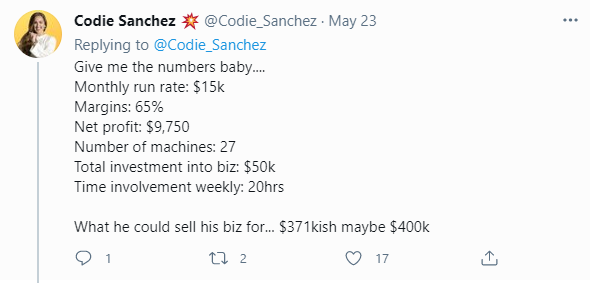“If anyone can refute me—show me I’m making a mistake or looking at things from the wrong perspective—I’ll gladly change. It’s the truth I’m after, and the truth never harmed anyone.”
~Marcus Aurelius
Greetings from LA and Hawaii.
This week we learned about the vending machine business model and the perils of fake news. We also share some of our favorite podcasts as well as a free website that will exercise your brain. Our challenge is for you to get some alone time.
Vending Machines
When you think of building a business, vending machines probably aren’t the first thing that comes to mind. But according to Codie Sanchez and Quinn Miller, it is a viable business model that can make as much as $10,000 a month.
Over here, Sanchez breaks down Miller’s vending machine methods in a Tweet thread, explaining the costs, profit margins, and even best machine placement.

Go check out the thread to learn more about this.
Or if vending machines aren’t really your thing, then check out this article from Shopify: No Inventory? No Problem: 13 Low-Investment Small Business Ideas
Fake News
Toomas Hendrik Ilves, the former president of Estonia, once said, “Fake news is cheap to produce. Genuine journalism is expensive.” And he was right. After all, if you can say anything to anyone without worrying about the validity of what you’re saying… then you can say a lot of stuff and get a lot of attention.
And in the 21st-century world with iPhones and social media, information is more easily spread than collected or refined. On Twitter, for instance, a false story is more likely to go viral than a real story. Furthermore, according to MIT research reported by The Atlantic, “a false story reaches 1,500 people six times quicker, on average, than a true story does. And while false stories outperform the truth on every subject—including business, terrorism and war, science and technology, and entertainment—fake news about politics regularly does best.”
This study analyzed 126,000 stories, tweeted by 3 million users, over more than 10 years.
On a personal level, there seem to be two lessons here — when consuming content online, have a healthy degree of skepticism and be willing to do your own research before adopting a new idea or belief (this is easier than ever before thanks to search engines), and also be wary of claiming something is “fake news” until you’ve done said research, even if you don’t like the potential truth.
Top Podcasts
Looking for a new podcast to get your brain whirring? Here are some of our favorites…
- The Tim Ferriss Show
- The Joe Rogan Experience
- The School of Greatness
- The Smart Passive Income Podcast
- Startalk
- Revisionist History
Brain Brilliance
Want to exercise your brain? Brilliant is a website with fun (and free) courses on foundational math, software development, science, foundational logic, data science, engineering, and more. In our opinion, it’s probably the best place for learning about those topics outside of academia.
To be clear, this is not a sponsor. We just think it’s awesome. We use it regularly and we don’t pay for it, although they do have a paid version that gives access to more advanced courses.
Extra Stuff
Here’s some other stuff that caught our attention this week…
- What the West Gets Wrong About China by Harvard Business Review
- The Spacefaring Paradox by Slate
- The specter of Mannetjies Roux by Africa Is A Country
The Weekly Challenge
Something magical happens when we’re alone and in silence when we’re forced to just be with ourselves. We often become more calm, introspective, and self-aware. So get some alone time this week, even if it’s just sneaking away to read or meditate for 30 minutes.
Until next week,
Mike & Alec
